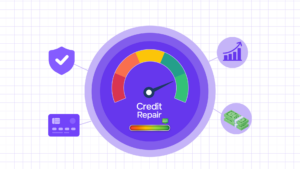
If you’ve ever tried to fix your credit, chances are you’ve come across plenty of advice—some helpful, some harmful, and some downright misleading. In 2025, with rapidly evolving financial tools and resources, it’s more important than ever to know these credit repair myths to separate fact from fictions.
Falling for common credit myths can lead to costly mistakes, wasted time, and even further damage to your score. This guide will debunk five widespread misconceptions about credit repair and provide you with actionable strategies to protect and rebuild your credit.
Ready? Let’s deep in!
1: Checking Your Own Credit Score Hurts It
Many people avoid checking their credit scores because they believe doing so will harm their credit. However, this is not true when you check your score personally. Accessing your own credit report results in a “soft inquiry,” which does not affect your credit score. Only “hard inquiries,” typically performed by lenders or creditors when you apply for a loan or credit card, can temporarily lower your score.
Why This Myth Persists:
Hard and soft credit inquiries are often confused because both involve reviewing your credit history. However, the consequences are vastly different. Soft inquiries are harmless, while hard inquiries may reduce your score by a few points.
Action Tip:
Make it a habit to review your credit report regularly—at least once a year—to monitor your progress and identify potential errors. You can obtain free reports from major credit bureaus (Equifax, Experian, and TransUnion) through AnnualCreditReport.com.
Pro Tip:
Many online tools and apps now offer to show you your credit score and report for free credit. Explore services like Credit Veto or your bank’s credit score feature.
2: Paying Off Collections Automatically Removes Them from Your Report
It’s a common assumption that paying off a debt in collections will make it disappear from your credit report. Unfortunately, this isn’t the case. Once a collection account is reported, it typically remains on your credit report for up to seven years from the date of the original delinquency—even if you pay it in full. While the account will be updated as “paid,” the negative history may still impact your score.
Why This Myth Persists:
The misunderstanding comes from equating debt payment with immediate credit score improvement. While paying off collections demonstrates financial responsibility, it doesn’t erase past mistakes.
Action Tip:
Negotiate a pay-for-delete agreement with the debt collector before making payments. In this arrangement, the collector agrees to remove the collection account from your credit report in exchange for payment.
Pro Tip:
Always get any agreements in writing to protect yourself if issues arise later. Request documentation confirming that the account will be deleted.
3: You Need to Carry a Balance to Build Credit
Many believe that keeping a small balance on their credit cards improves their credit score. In reality, carrying a balance can lead to unnecessary interest payments without providing additional credit benefits. Credit utilization—the ratio of your credit card balance to your credit limit—is a significant factor in your score. A lower utilization rate is better.
Why This Myth Persists:
Confusion between credit utilization and payment activity often leads to this misconception. Payment activity (making regular, on-time payments) affects your score, but the idea that you must carry debt to improve it is false.
Action Tip:
Keep your credit utilization below 30% to optimize your score. If your credit limit is $5,000, aim to keep your balance under $1,500.
Pro Tip:
If you pay off your card monthly, consider making payments before your statement closes. This lowers the balance reported to credit bureaus.
4: You Can Pay Someone to Erase Bad Credit
No legitimate service can remove accurate negative information from your credit report before the legally mandated time. Companies promising to “erase” your bad credit or create a “new” credit identity are scams. Under the Fair Credit Reporting Act (FCRA), negative information, like late payments or bankruptcies, remains on your report for a set period.
Why This Myth Persists:
Credit repair scams prey on consumers desperate to improve their credit quickly. They use misleading advertising to promise results that are not legally possible.
Action Tip:
Focus on disputing inaccuracies and building better credit habits rather than looking for quick fixes.
Pro Tip:
Research any credit repair service thoroughly. Look for reputable, nonprofit credit counselling agencies accredited by the National Foundation for Credit Counseling (NFCC) and legit credit repair services like Credit Veto.
5: Closing Old Accounts Boosts Your Score
Closing old credit accounts can reduce your available credit and shorten your credit history—two factors that contribute to your credit score. While closing unused accounts might seem like a good way to simplify your finances, it can negatively impact your score if not done carefully.
Why This Myth Persists:
Many believe that fewer open accounts translate to better credit management. However, the opposite is often true.
Action Tip:
Keep old accounts open, especially those with positive payment histories, unless there are annual fees or security concerns. Use them occasionally to keep them active.
Pro Tip:
If you must close an account, choose one with a short history or a high-interest rate to minimize the impact on your score.
Why It’s Important to Bust These Myths
Misconceptions about credit repair can stall your progress or lead to decisions that hurt your financial health. By focusing on proven strategies and avoiding falsehoods, you can take control of your credit repair journey with confidence.
KEY TAKEAWAYS:
- Checking your credit score won’t hurt it—monitor regularly.
- Paying off collections doesn’t automatically remove them—negotiate pay-for-delete.
- Carrying a balance isn’t necessary to build credit—keep utilization low.
- No one can erase accurate negative marks—dispute errors and avoid scams.
- Closing old accounts often does more harm than good—keep them open.
- Take Action and Master Your Credit Repair
Ready to turn this knowledge into power? Stop believing the myths and start applying proven strategies to rebuild your credit. Credit repair takes time, patience, and persistence—but the payoff is worth it.
Follow Credit Veto on our social media pages for daily tips and insights. For a deeper dive into actionable credit repair strategies, sign up for our free webinar today. Get expert advice, personalized insights, and a step-by-step plan to improve your creditand secure your financial future.
Don’t wait—take hold of your credit journey now!




